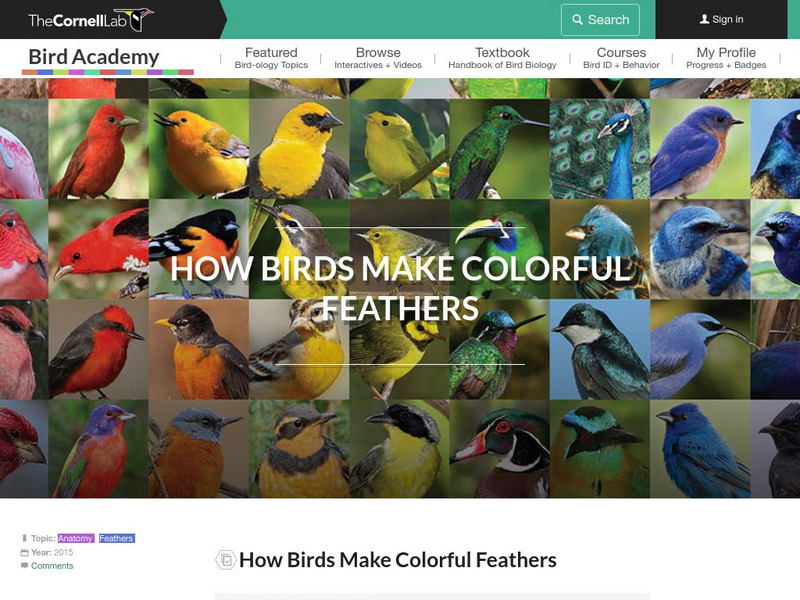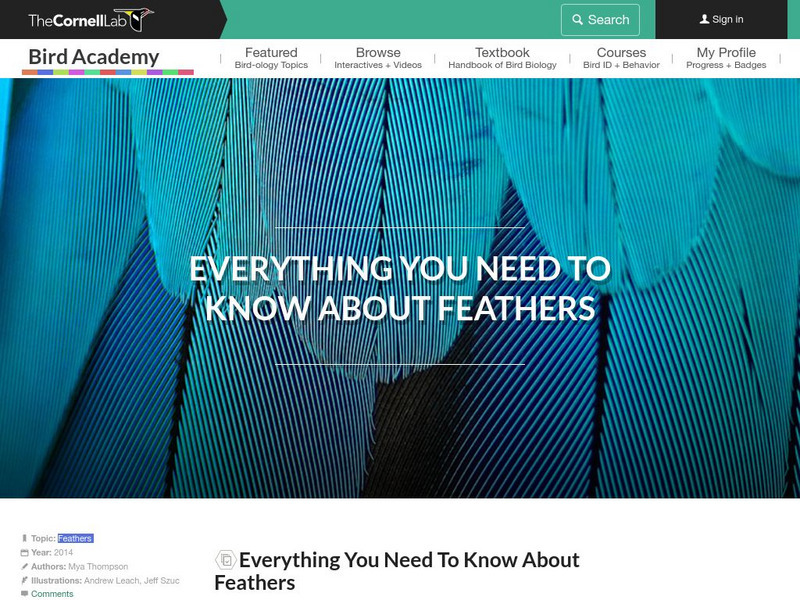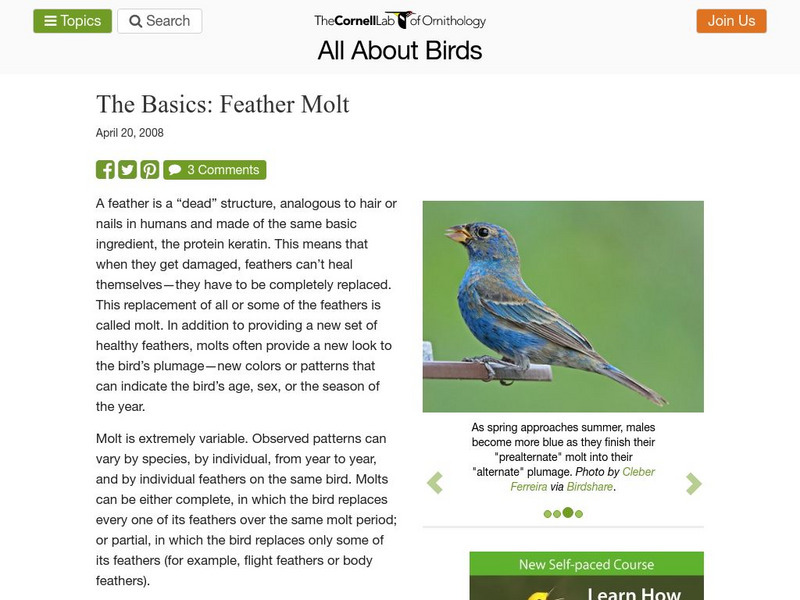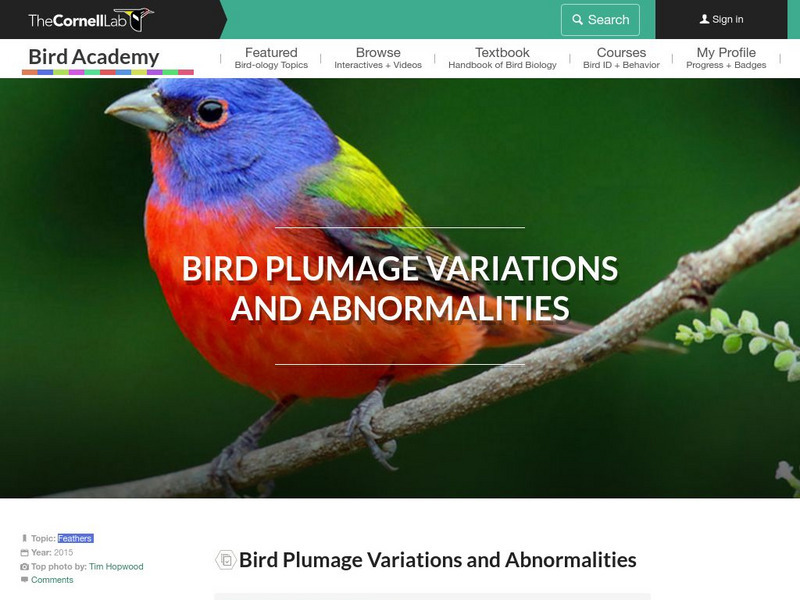Curated OER
Birds
In this birds worksheet, students read a 2 page informational excerpt about birds and the study of birds, ornithology. They then use the information the learned to answer the 10 questions in the packet. The answers are located on the...
Curated OER
Evaluating the Strength of Scientific Evidence: The Rediscovery of the Ivory-billed Woodpecker
A happy discovery occurred in Arkansas in 2004: a woodpecker, believed to be extinct since the 1940s, reappeared! Or did it? Middle to high school ecologists examine scientific evidence and use critical-thinking skills to determine...
Curated OER
Change or Adaptation
Students identify the adaptive forces in the life cycle of plants, animals, and humans, isolate and identify the role that change and adaptation play in extreme environments and research and write a short term paper using MLA citations.
Curated OER
The Extinction of Dinosaurs
Students study the life and death of the dinosaur by building dioramas. For this dinosaur lesson, students research the extinct creatures, then build dinosaur dioramas. Afterward, the students engage in a discussion about the extinction...
Curated OER
Birds of Wisconsin
First graders explore the job done by ornithologists. They role play identifying the characteristics that make a bird a bird. They discuss what makes each bird species unique. Students are introduced to Wisconsin's most common and rare...
Cornell Lab of Ornithology
Cornell Lab of Ornithology: Snowy Owl
Read the abbreviated description of the Snowy Owl and delve into a more detailed description of this bird if this information is insufficient. While reading about this interesting bird you can listen to the sounds of this species.
Cornell Lab of Ornithology
Cornell Lab of Ornithology: Bird Feather Color
Yes, birds can see color and this site delves into pigmentation, color abnormalities, and structural colors of birds' feathers.
Cornell Lab of Ornithology
Cornell Lab of Ornithology: Feather Structure
This site provides a detailed explanation of the structure of bird feathers. Topics include feather topography, types of feathers, and feathers and flight.
Cornell Lab of Ornithology
Cornell Lab of Ornithology: Molting
Why do birds molt? How many times a year do they molt? When do birds molt? These questions and more are answered on this comprehensive site.
Cornell Lab of Ornithology
Cornell Lab of Ornithology: A Calliope Hummingbird Molts Its Gorget Feathers
Striking photos are presented in this colorful site that show the molting stages of the Calliope Hummingbird.
Cornell Lab of Ornithology
Cornell Lab of Ornithology: Bird Feather Plumage Variations
Plumage variations can be based on a number of factors. This brief but informative examines single plumage patterns, seasonal variations, and sexual dimorphism.
Cornell Lab of Ornithology
Cornell Lab of Ornithology: Rhinoceros Auklet
On this thorough site, you will find cool facts, description, range, habitat, conservation and more. Listen to the sounds of this bird species on this site as well.
Cornell Lab of Ornithology
Cornell Lab of Ornithology: Atlantic Puffin
This concise site presents facts related to appearance, range, conservation, and other names used to identify this bird species. Listen to the sounds of the Atlantic Puffin on this site as well.
Cornell Lab of Ornithology
Cornell Lab of Ornithology: Horned Puffin
This thorough site features cool facts, range information, behavior patterns, conservation status and more. Listen to the sounds of this bird species on this site.
Cornell Lab of Ornithology
Cornell Lab of Ornithology: Yellow Billed Cuckoo
Clear and concise facts and sounds of the Yellow-billed Cuckoo can be found on this thorough site. Listen to the sounds of this bird species on this site as well.
Cornell Lab of Ornithology
Cornell Lab of Ornithology: Black Billed Cuckoo
Cool facts, description, range, habitat, food, behavior, reproduction, and conservation status are topics highlighted on this impressive site. Listen to the sounds of this bird species on this site as well.
Cornell Lab of Ornithology
Cornell Lab of Ornithology: Red Cockaded Woodpecker
An abundance of facts and sounds of the Red-cockaded Woodpecker are found on this thorough site. Topics discussed include: description, range, habitat, food, behavior, and more.
Cornell Lab of Ornithology
Cornell Lab of Ornithology: Boreal Chickadee
A concise site that presents the following topics: cool facts, description, range, conservation status, and other names. Listen to the sounds of this bird species on this site as well.
Cornell Lab of Ornithology
Cornell Lab of Ornithology: Juniper Titmouse
While incubating, the female Juniper Titmouse hisses like a snake if disturbed. Find more interesting facts on this thorough site along with information on range, habitat, behavior, and more.
Cornell Lab of Ornithology
Cornell Lab of Ornithology: Pygmy Nuthatch
Listen to the sounds and enjoy reading the many facts found on this informative site. Topics discussed include: description, range, habitat, food, behavior, reproduction and more.
Cornell Lab of Ornithology
Cornell Lab of Ornithology: Brown Headed Nuthatch
Did you know that the Brown-headed Nuthatch uses tools to find its food? Find more interesting facts and listen to the songs of this bird species on this thorough site.
Cornell Lab of Ornithology
Cornell Lab of Ornithology: Rock Wren
Listen to the songs of this species and examine the many facts found on this thorough site. A menu of topics includes: range, habitat, food, behavior, reproduction, and more.
Cornell Lab of Ornithology
Cornell Lab of Ornithology: Canyon Wren
The Canyon Wren has not been known to drink water. Find out why and examine the many other facts presented on this competent site. Listen to the sounds of this bird species as well on this site
Cornell Lab of Ornithology
Cornell Lab of Ornithology: Carolina Wren
Peruse the facts, listen to the sounds, and view pictures of the Carolina Wren on this informative site. A menu of topics includes: range, habitat, food, behavior, reproduction,and more.

























